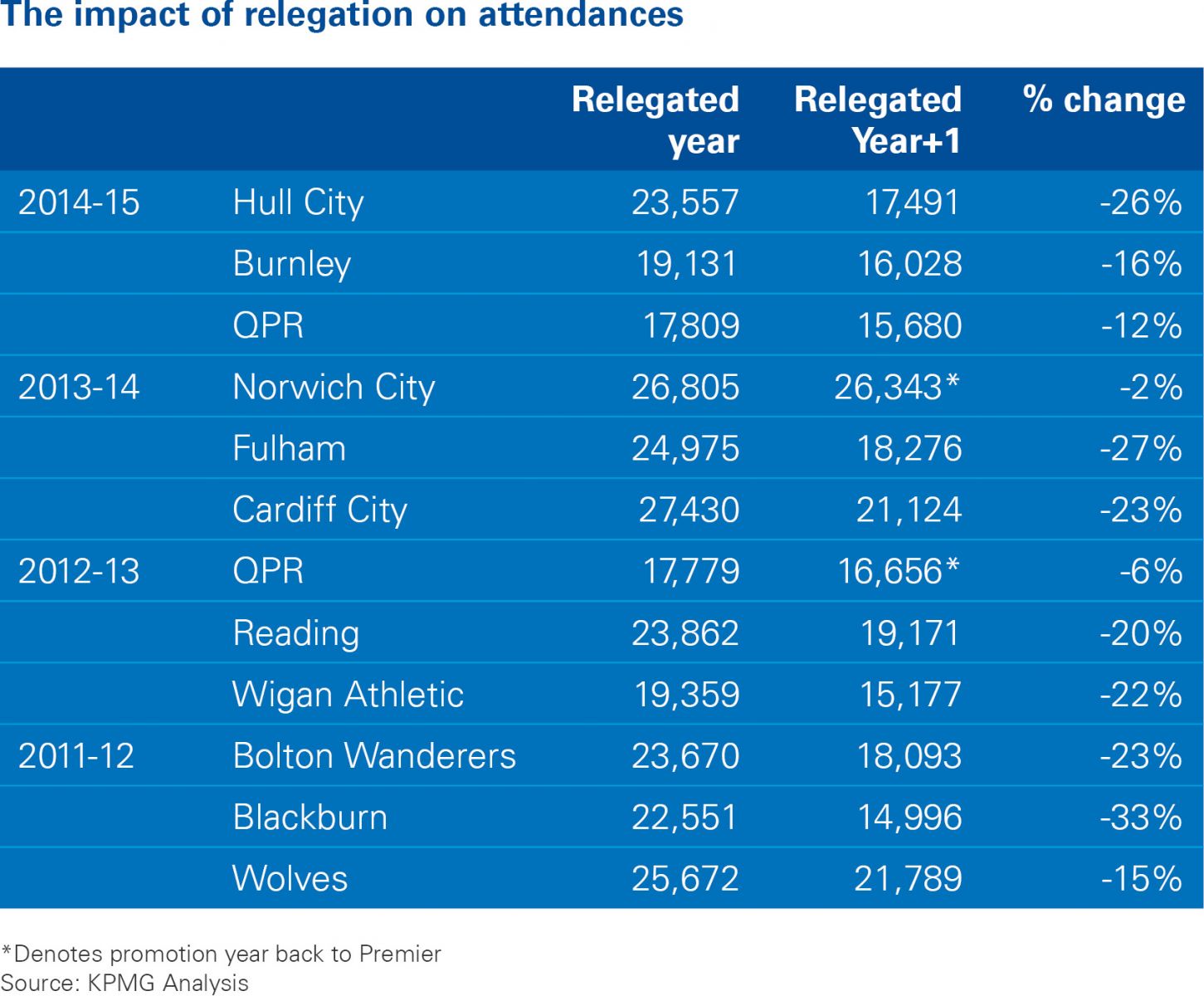Relegation from the English Premier League has never been more costly than it will be in 2016. From 2016-17, the income from Broadcasting rights will reach unprecedented heights for the Premier, consolidating its position among the wealthiest leagues in the world. The three clubs that drop into the Championship this summer will experience the usual shocks associated with failure, but the enhanced sponsorship income will make relegation an even more bitter pill to swallow.
The prospect of relegation forces clubs to act, either in mid-season, in the final run-in or at the end of the campaign. The fear of life at a lower level, and the likelihood of upheaval, club restructuring and departure of key players fills club chairmen and owners with dread. And it’s clear to see why.
Aside from the loss of prestige, the commercial aspect of relegation is becoming more and more like a financial catastrophe. Just consider that in 2014-15, the Premier League paid out GBP 1.6 billion in “central income” prize money. The Premier claims that the revenue distributed to clubs is the most equitable of all Europe’s major football leagues - a ratio of 1.53:1 between the champions and the bottom-placed club.
In 2014-15, the Premier League divided 50% of UK broadcasting revenue equally among the 20 member clubs and similarly shared all international broadcasting revenue and central commercial revenues. A quarter of UK broadcasting revenue was paid in merit payments and the remaining 25% in facility fees each time a club’s matches were broadcast live in the UK.
What did this translate to for the 2014-15 season? Chelsea FC, as champions, received a total of GBP 99 million – of which GBP 25 million was based on merit, GBP 20 million on their TV coverage – equating to approximately GBP 800,000 per live game. In addition to these variables, Chelsea FC, and all the other Premier League clubs, received GBP 54 million. The three relegated clubs, Hull City AFC, Burnley FC and Queens Park Rangers FC, received in excess of GBP 60 million apiece overall.
So-called parachute payments attempt to cushion the blow of leaving the Premier, but these pale into insignificance when compared to the aforementioned figures – historically these payments have been GBP 25 million for the first year, GBP 20 million in year two and GBP 10 million apiece in the third and fourth years. This is set to reduce to three years. Total revenues in 2013-14 for the Premier League clubs averaged out at GBP 163 million, approximately eight times higher if compared to the Championship – this underlines the vast gulf between the two leagues.
It is no surprise, then, that clubs cling on to the hope of staving off relegation right up until the last game, often sacrificing success in other competitions to prioritise Premier League survival. This invariably means, as demonstrated in the recent appointment of Rafael Benitez by Newcastle United FC, that clubs will change managers in the hope of transforming their fortunes.
Newcastle United FC’s decision to remove Steve McClaren in mid-March is late in the season and may not have the desired effect due to the lack of time available to Benitez. A change of manager is often the precursor for squad rebuilding, but Newcastle United FC do not have the luxury of a transfer window in which to reinforce their bid for survival.
Mid-season appointments, historically, do not always work. Only approximately half of all mid-season Premier League appointments over the past five seasons have proved to be successful in terms of points won. A change of management is one of the main disruptors brought about by relegation. That said, of the three Premier clubs relegated in 2014-15, only Queens Park Rangers FC changed their manager mid-season and have done so again in 2015-16 in the Championship. Hull City AFC and Burnley FC both persisted with Steve Bruce and Sean Dyche respectively, and they are enjoying far better seasons than QPR FC, despite the London club’s resources.
Another major disruptor is the public reaction to relegation. Clubs, inevitably, face a decline in attendances, which of course means lower matchday revenues. On average, relegated clubs’ attendance figures have fallen by around 20% in the first year following demotion to the Championship. Some clubs, such as Blackburn Rovers FC, Hull City AFC and Birmingham City FC have seen their attendances fall by more than a quarter in the year after falling out of the Premier.

The consequence of relegation also includes legacy wage bills that can severely burden clubs now getting to grips with lower income streams, especially those that have risen through the ranks quickly. Relegation is often the signal for a huge exodus of players, either by the design of the club or through the departure of disillusioned players wanting to retain their top level status. Some clubs have significant “drop clauses” inserted into player contracts to allow for relegation.
This would appear to be a very pragmatic approach, especially for the bulk of Premier League clubs that cannot realistically compete for UEFA Champions League places and those whose general administration and financial structure lags team performance. Whatever business model clubs adopt, the need to implement stringent financial planning, that has some margin for error, would seem to be prudent. Relegation could trigger a club restructuring programme off the field to ensure the club’s financial position is robust enough to withstand the headwinds of relegation.
Given the seismic effect that a drop in status can bring to a long established Premier club, ranging from the impact of lower crowds and significantly reduced commercial income to wage bill issues, not to mention the human cost, KPMG’s club “healthcheck” can identify strengths and weaknesses and develop a roadmap aligned to the club’s future objectives. It could well be the first step towards regaining that Premier League place!





